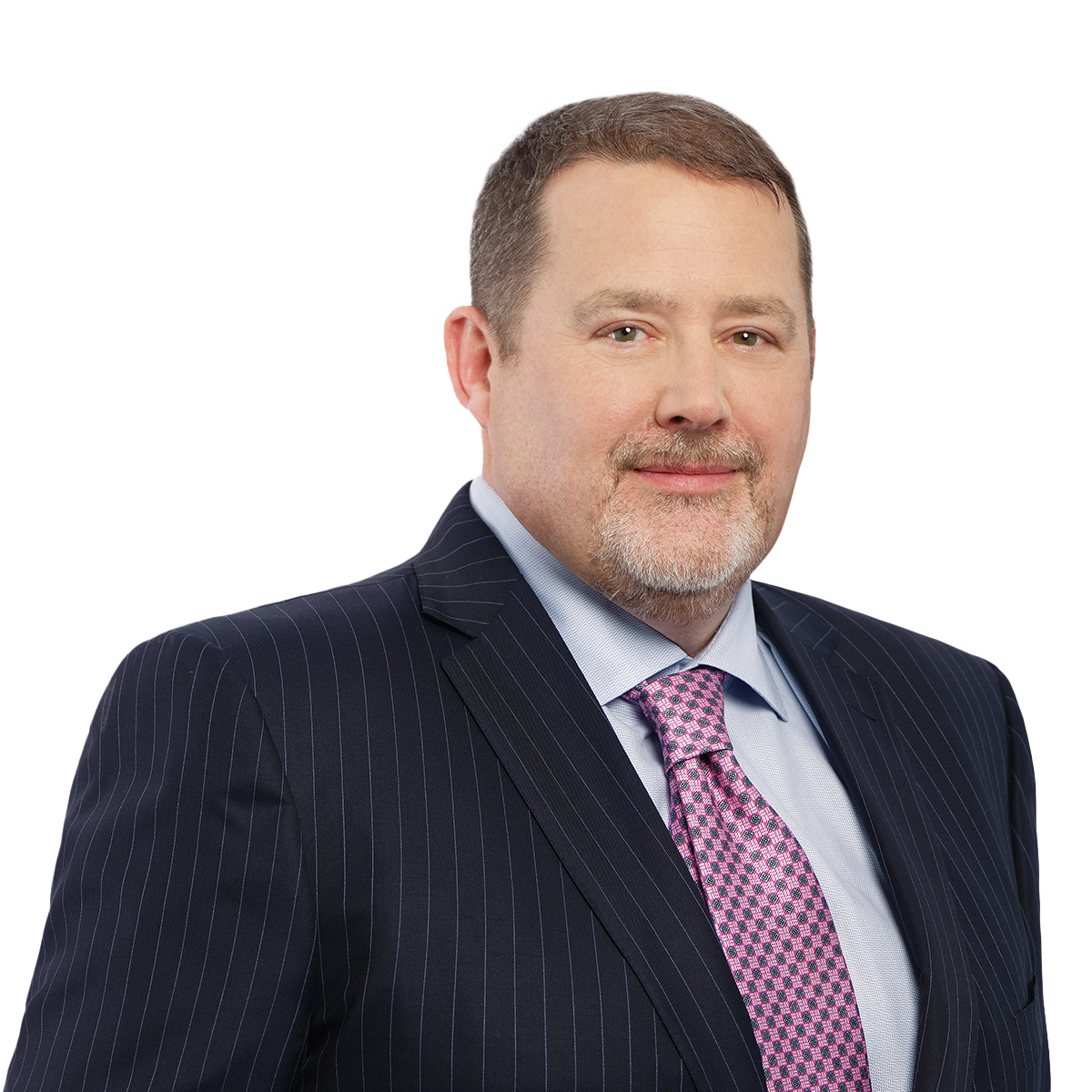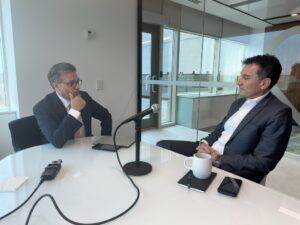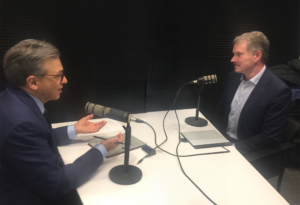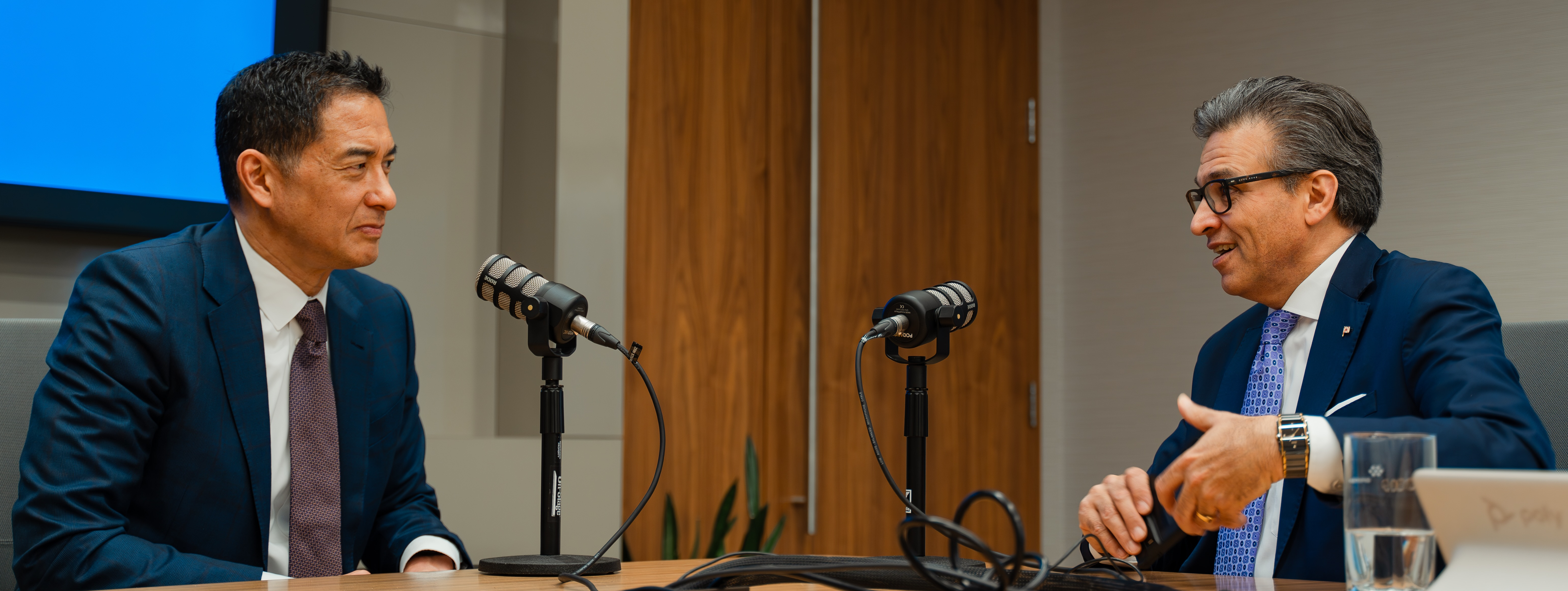Alex is a veteran of Alberta’s oil and gas industry. He retired in 2017 after almost three decades at TransCanada Corporation, most recently as Chief Operating Officer. But he couldn’t stay away long. His competitive spirit and strong belief in the energy sector soon brought him back to lead Cenovus.
In this episode, Alex shares his views on family, on leading in tough times, and on the fight to protect Canada’s place in the global energy market.
Goldy Hyder:
Welcome to Speaking of Business Conversations with Canadian innovators, entrepreneurs, and business leaders. I’m Goldy Hyder, President and CEO of the Business Council of Canada. Today I’m speaking with Alex Pourbaix, President and CEO of Cenovus Energy. Alex is a veteran of Alberta’s oil and gas industry. He retired in 2017 after almost three decades at TransCanada Corporation, most recently as chief operating officer. But he couldn’t stay away long, his competitive spirit and strong belief in the energy sector soon brought him back to lead Cenovus. In this episode, Alex shares his views on family, on leading in tough times, and on the fight to protect Canada’s place in the global energy market. I hope you’ll enjoy our conversation. Alex, thanks for doing this.
Alex Pourbaix:
Oh, happy to do it, Goldy.
Goldy Hyder:
Well, it’s great to have you here. Normally I say to people, how are you? But that’s a dangerous question to ask the CEO of an energy company these days. But how are you?
Alex Pourbaix:
I remind everybody that everything is temporary, but right now with the curtailment that the Alberta government has implemented, for the short term the industry is doing reasonably well.
Goldy Hyder:
I’m sure we’ll come back to that, but I’m glad to hear you’re good. Let’s start off way back, if you will. I mean, let’s talk a little bit about your journey here. You’re born in Edmonton, pretty much stayed in Alberta, worked in Alberta, worked very hard and very long at TransCanada, then moved over. Just take us through the journey. How did this all unfold and when did you realize this is what I want to do with my life?
Alex Pourbaix:
I think like a lot of young people, I think it’s probably fair to say I kind of fell into things. I grew up in Edmonton and I had a theory that I wanted to be a lawyer, so I ended up attending U of T in Ontario. And after I graduated, I went back to Edmonton where I practiced law. I met my future wife there, she was a Calgarian, and I wanted-
Goldy Hyder:
Moved up I see.
Alex Pourbaix:
Well-
Goldy Hyder:
Sorry, I’m Calgarian.
Alex Pourbaix:
… I do have one view is what I’ve learned is that Edmontonians can move to Calgary and be happy, but Calgarians cannot move to Edmonton and be happy. So my wife made it pretty clear that our future lay in Calgary, and I was happy with that. I worked in the energy trading business for a number of years as a lawyer, and once I got to TransCanada, I knew law wasn’t for me. I tried a whole bunch of different things and I then followed with about a 24-year career at TransCanada, doing just about everything under the sun from BD, to marketing, to trading, to operating building pipelines, you name it. And I ended my career there three years as COO. I think it’d be fair to I was looking for something a little different and I was approached shortly after I retired to see whether I’d be interested in coming to Cenovus.
Goldy Hyder:
So this is retirement.
Alex Pourbaix:
Yeah. My wife reminds me that my retirement lasted four months. So I’ve now been at Cenovus for about 18 months and the company is going in a good direction and we’re doing a lot of good things.
Goldy Hyder:
I think a reporter, Deborah Yedlin in the Calgary Herald said, this is a failed at retirement experiment for you.
Alex Pourbaix:
Yeah.
Goldy Hyder:
A couple of things you just said, I want to go back to. One is it’s really interesting to me that you did law, you practiced law, you were a lawyer, you went to school to become a lawyer, and yet you realize it wasn’t for me. I have to say in my life, in my own life, I’ve come across so many lawyers who don’t practice the law. What do you say to the aspiring people who want to go into law today?
Alex Pourbaix:
It’s very interesting. I think the facts are somewhere around 70% of people who graduate from law school 10 years later doing something different, at least that’s the number I heard. What I like to think about a legal education, if you do it right, I think the one thing they try to instill in you is how to think logically and be persuasive. And I think those are skills that are really helpful in a lot of careers. And in my own case, I felt I had certain deficiencies. Number one, I think my attention span was too short to be a lawyer, and I found that I was getting tired of documenting and negotiating all these deals and seeing the commercial guys get all the credit for it. So that was the other thing that kind of got me going. I thought geez is hard work for very little recognition.
Goldy Hyder:
Well, speaking of hard work, why don’t we go right back to the very beginning. Tell me about your first job and what you learned from it.
Alex Pourbaix:
I worked in the back shop of a golf course in Edmonton, and I think I was 13 years old, and my job in the summer was to ride my bike down to the Mayfair golf course at five in the morning on weekends and set up all the golf bags for the golfers who were going out in the foursomes in the morning. And I think from a very early age, examples like that taught me the value of hard work, being accountable, things like that.
Goldy Hyder:
And shortly after that, I think you had a bricklayer’s job.
Alex Pourbaix:
I did.
Goldy Hyder:
Speaking of hard work. What did that teach you?
Alex Pourbaix:
Basically, I paid my way through university by being a bricklayer. And for those who haven’t done it, that would be one of the most physically demanding jobs. You could do long hours, in Alberta you only get to lay bricks about six months of the year. So when the sun shines and the snow wasn’t flying, it’s a lot of work. But no, it was a great job. It enabled me to pay my way all the way through university without putting too much undue pressure on my family. I’ve probably had 20 different jobs in my career, and I think doing that very broad of things really is an incredible education and an opportunity.
Goldy Hyder:
Well, you hear these days that kids coming out of university should be ready to have 10, 20 jobs. Any advice for them?
Alex Pourbaix:
It’s funny. I mean, with our own young people at Cenovus, the one thing I say to all of them, particularly those who really do have ambitions to move up in the organization, I encourage them to just find as many different things to do in the company as possible and not to get cubby holed in one specific job because it ultimately is really limiting to where you can take your career.
Goldy Hyder:
Now you’ve got kids, I think one of them is actually even in your business.
Alex Pourbaix:
Yeah. I have a daughter who is a co-op student at Cenovus going back to university here shortly. And then another daughter who graduated from UBC in business and she’s been in Australia working for Tesla of all things, and she has just come back.
Goldy Hyder:
You get any discounts on those things now?
Alex Pourbaix:
Oh geez, I don’t think that didn’t appear to be available. But she decided she missed Canada, and so she’s come back and she’s going to be out looking for a job. So if any of the listeners have any ideas.
Goldy Hyder:
You’ve spent, correct me if I’m wrong, but I think your career has pretty much been in Canada.
Alex Pourbaix:
Yeah. At TransCanada, my main base was always Calgary. But for most of my career at TransCanada, I was responsible for US businesses, and so I would regularly be on the road a hundred plus days a year almost entirely either in the US or Mexico.
Goldy Hyder:
And what’s your sense of how Canada stacks up? How are we perceived?
Alex Pourbaix:
It’s funny, I think Canadians have a well-deserved reputation for being pleasant, being nice, being thoughtful. The knock you would hear in the US is, we’re too nice, we’re not competitive enough. I think there’s an element of that. I think the idea of aggressive competition is a little more foreign to Canadians than it is to Americans, particularly in business. But I’ve been around enough to see that there’s lots of good coming out of being a Canadian also.
Goldy Hyder:
You were TransCanada for 27 years or so, and then as we mentioned, you retired only to take on this new position. Just take us through that process, leaving a company after almost three decades of service, you’re the CEO, what happened? Why did you retire and why did you get back into it?
Alex Pourbaix:
From my own perspective, it looked to me like I was going to be kind of in the same role for a while. And after that long with one company, I had an itch to do something a little bit different. And I think it would be probably fair to say that I also felt that I had earned the right to have an opportunity to run an organization. And so when I left TransCanada, I certainly didn’t intend to be retired forever, but I did intend to take a little more than four months off. But this opportunity with Cenovus came along, it was an opportunity to help lead an organization. I view it, and still do, as a great Alberta company that had come upon some hard times over the past couple of years. And so I will admit that as a proud Albertan, I saw a company that I thought I could help, and I felt a bit of an obligation to see if I could do something.
Goldy Hyder:
I’m going to come back to the hard times comment because there’s a lot to talk about there. But let me just ask a little bit about, I’ve always been intrigued with this COO CEO, it’s often opposites that make for a great team, right?
Alex Pourbaix:
Yeah.
Goldy Hyder:
And you’ve experienced both. Do you think that’s true?
Alex Pourbaix:
Yeah, I do. Well, I shouldn’t say that, but I think the COO role, it works in a couple of situations. I think it works if it is a relatively temporary stop to that person becoming a CEO or it can work if you have a COO who truly loves the nuts and bolts and operating that business and driving costs and safety and all the other elements of it and doesn’t really have ambition. If you have a CEO who enjoys their role and you have a COO who is ambitious and views it as a stepping stone, then I think if it becomes more than a temporary thing it’s a challenging thing at times.
Goldy Hyder:
Yeah. I mean, there are other members of the business council I’ve spoken with who say, to be a successful CEO you really need to understand the nuts and bolts. You need to understand the operations. And I have to confess, I’ve never been inclined towards the COO side of things. So I was just wondering, given that you’ve had both roles, do you treat your COO differently than how you were treated as a COO now?
Alex Pourbaix:
I don’t have a COO right now. I haven’t gone to that step in my organization, but-
Goldy Hyder:
Isn’t that interesting?
Alex Pourbaix:
Yeah.
Goldy Hyder:
Maybe there’s something to what I’m talking about.
Alex Pourbaix:
No, yeah, I think you probably are onto something. But personally I would agree with a statement that a CEO really needs to understand the business with a great deal of detail. But I think that is a different thing than making every decision in a business. And I am a firm believer in putting in place a really competent executive team, giving them the accountabilities they need and the decision rights they need to do their jobs. So although I certainly do deep dives from time to time, I do try to wherever possible let them do their jobs and I’m kind of there for course correction.
Goldy Hyder:
Now, you mentioned hard times and leading in hard times. There’s a lot of hard times these days, but before we get to today, I’d like to talk a little bit more about your time at TransCanada around Energy East. I mean, here’s a project of basically sharing our resources with our own family members in other parts of the country, and yet we weren’t able to get her done. What do you think happened and what would you do differently if you could do it all over again?
Alex Pourbaix:
I would agree with you and your characterization of energy. I don’t think I have ever seen an infrastructure project in this country that was more important, more necessary, or would’ve been more beneficial to the country. As you know, we have a situation here where we are the fourth-largest producer of oil in the world, and we don’t even supply the majority of our country’s oil needs. Pretty much everything east of Ontario gets the majority of their oil offshore. So no, I was a huge supporter of the project. I was responsible for it. I think most of the time we had it going. But I think at the end of the day, in order for that project to have proceeded, it would’ve required all levels of government that were completely supportive of that project going ahead and willing to make tough decisions. I think it’s no surprise that the project suffered from a lack of government support in the province of Quebec.
And I think at the end of the day, I don’t want to speak for the present management of TransCanada, but I think after the project was taken back to the start of the drawing board at the NEB and forced to basically refile everything and start from the beginning, I think that was about as strong a message as you could have got. The real question was, at the end of the day would this project get the required federal support to go forward? And I think having spent somewhere in the range of a billion dollars in the development and then being put in a situation to have to basically start over again, I think it started to become pretty apparent to its promoters that it wasn’t going to get the support it needed from a political perspective.
Goldy Hyder:
I mean, and the irony here is it’s widely believed that the Canada brand, particularly around the energy sector, is well regarded outside of Canada but not inside of Canada. Why do you think that is and what responsibility do you feel having been in that position for witnessing that to happen?
Alex Pourbaix:
Well, I kind of take it back to basic supply and demand. And just this isn’t always intuitively obvious to people, but if Canada’s production of oil were to go to zero tomorrow, the world would not consume one less drop of oil. All you would be doing is changing the locations from which that oil is produced. And I would tell you having worked and lived in this industry for my entire professional career, there is no jurisdiction that takes the environment and safety, safety of people, safety of water, of air, of land more seriously than Canadians. And anybody who thinks that the world is more environmentally safe place with less Canadian oil has rocks in their head. That demand is going to be served, it’s just going to come from places that care far, far less about the environment than Canada. And I think our industry needs to do a better job of speaking to Canadians, speaking to our stakeholders, but I think it is a very fair characterization that most Canadians do not understand the track record of the industry.
Goldy Hyder:
Yet I will say, I mean most surveys or polls I’ve seen continue to show the vast majority of Canadians do support that infrastructure. My experience has been Canadians are a smart group of people. If you give them good information and share with them and listen to what they’re saying, they usually find the right answer. Now, speaking of need for right answers, you arrive at Cenovus and if timing is everything in life, boy. If I got this right, you had a lot of debt, your oil prices were in a deep slump. Obviously there’s been a critical lack of pipeline capacity. The anti-oil activists are, they’re running roughshod over some of these issues. Do you ever look in the mirror and say why the hell did I take this job?
Alex Pourbaix:
I think it would be fair to say that after I was there about a month or two, I think I probably went home and said to my wife, “Holy cow, what have I got myself into?” And I did not have a sympathetic ear in those early days. But I mean, you’re absolutely right. When I joined the company, I think we had about $15 billion worth of debt just as we were moving into a period where Alberta Oil was, it was the lowest price oil in the world for a good part of the second half of last year. So there were a lot of challenges with the company, but I would tell you at the end of the day what attracted me to the company, it has the best oil assets, certainly in North America. It has some of the most incredibly impressive, technically skilled employees. And most of the challenges the company was facing, it had nothing to do with its assets or its people, it was external issues. And we’ve been able to basically have the debt in the 18 months that I’ve been there, I’m feeling really good about where we are with debt. Although we’re not out of the woods on oil prices, I think we’ve seen a strong recovery in oil prices with the government curtailment. And what this industry really desperately needs is some new pipeline access to get our oil to market.
Goldy Hyder:
Now during this process you weren’t afraid at all to distinguish yourself in terms of what the industry needed. Obviously, a number of your counterparts had some different points of view on this. And yet you put your hand up, you spoke up, you made some direct interventions with Premier Notley at the time. And just take us through the thinking. I mean, what was this all about? Was it about the company? Was it about the industry? Was it about the sector? Was it about the province? What drove you to say, you know what, this is unsustainable and we need to do something?
Alex Pourbaix:
Honestly, it was all of the above. It was funny kind of by September of 2018, what was going on is that production in the province, because of investment decisions made years ago, production continued to increase in 2018 but the pipeline egress did not increase. And we got to a point in the second half of last year where we had too much production chasing too few barrels. And as you know, the laws of economics is that marginal barrel will price every barrel. And the differential between the value of Canadian heavy oil and the value of WTI, it had probably averaged like 15 bucks probably for the last 20 years. It got as high as $52, US, at discount per barrel at the same time that WTI was falling south of $50 a barrel. So imagine this, Goldy, we are actually producing our barrels at a cash loss.
I make no bones about advocating for curtailment. And for me, it was really quite simple. The people who were going to benefit were few and far between, and they were largely foreign refiners were the ones who were getting the lion’s share of the benefit from this. It was devastating. The economy of Alberta was devastating the oil industry, and it was actually going to devastate the royalty revenue of the Alberta government. And I just saw this opportunity where merely by a modest cut in production, less than 10%, 6, 7, 8%, we could balance supply and demand. And you’ve seen the results since then. Differentials are now sub $10 a barrel. The industry is strong, royalty revenue is good. Ultimately, we do have to get out of curtailment, but I really view it we were facing a existential threat to our province and to our industry.
Goldy Hyder:
Alex, you just mentioned curtailment. I think it’s important for the benefit of our listeners to understand what you mean by that.
Alex Pourbaix:
Sure. Over the past several years oil production in the province of Alberta has continued to increase largely because of investment decisions that have been made in many cases many, many years ago. And as I think most of your listeners will know, we have not had a lot of success adding pipeline capacity to get that oil out of the province. And so what happened in the fourth quarter of last year is that the production exceeded the takeaway capacity, that was driving prices of oil in Alberta down literally to basically we were giving it away for free. And the argument that I and a number of others made was that the government had the ability under existing legislation to actually mandate production cuts on the upstream sector.
And it had actually been done by Premier Lougheed back in the National Energy Program era when we had a similar scenario where Alberta’s oil and gas was worth very little. And I simply went to the government and reminded them that those laws were still on the books, and they had the ability to step in and mandate very modest volumetric production cuts across the upstream producers. And my theory was that if the government did this, we would see that discount that Canadian oil was receiving to global benchmarks would largely disappear. And we call that curtailment, that action by government we call curtailment. And I think it would be fair to say that it worked better than anyone’s wildest dreams.
Goldy Hyder:
I want to unpack that a bit because I think this is a great learning for many of our younger listeners. First of all, you had interaction with government. Talk to us about that. And secondly, let’s go behind the scenes and really understand how you were able to manage the peer-to-peer pressure in an industry that’s a tight group of people where you were offside with what many others were saying. Talk to us about both of those things.
Alex Pourbaix:
Yeah. I mean, I’d talk about the government first. Actually, this is one of the more satisfying experiences I’ve had in my life from a governmental perspective because when we first came up with this idea of curtailment, as you can imagine, this was completely out of left field. I think it would be fair to say that the NDP government was they, although they, I think, quickly understood how it could help the province. I think interestingly, I think their biggest fear was to be seen as meddling in a free market. And I thought that was very interesting that this purportedly left of center party was actually very, very worried about the perception that they were meddling in socialism.
Goldy Hyder:
Well, it is Alberta after all. Even the left there isn’t really the left.
Alex Pourbaix:
Fair enough. On the other hand, and I have to give the UCP a great deal of credit. At the time, obviously Jason Kenney and the UCP were jockeying for an upcoming election, and I think it would’ve been the easiest thing in the world for Jason and the UCP to treat this as an opportunity to really tee off on the NDP, trying to control the levers of production. And in fact, the discussions that I had with Jason, and he and I had many, but his comment to me, he said to me, and I hope I don’t get in trouble for sharing this, but he said to me, “Alex, I’m going to go in the legislature tomorrow morning and I’m going to support the government, this idea of curtailment. This is not a time for partisanship, this is a time we got to save our province”. I found that to be an incredibly impressive and a tough decision for him to make. So I was really pleased to see both parties realizing the problem we were in.
Goldy Hyder:
And what about the peer-to-peer? How did you handle the feedback from your colleagues who disagreed with your point of view?
Alex Pourbaix:
There were definitely a few discussions.
Goldy Hyder:
Did it get heated?
Alex Pourbaix:
Yeah. Yeah, it got heated. But I also, I have to give industry a great deal of credit. We disagreed on the way to solve this problem, but I think all of us agreed there was a very serious problem. And my argument was if I thought that letting the market decide would’ve solved the problem, I’d have been all for that. But it was just clear to me that wasn’t going to occur. I would tell you that since that time, we still go to CAP meetings, we still collaborate on other issues. We probably agree to disagree on this. But I think the positive is that if you take a look and see where differentials have gone, I think it would be very hard to argue that pretty much every upstream company has not significantly benefited from curtailment.
Goldy Hyder:
Well, look, we’ve covered a lot of ground on that issue, so let’s move on because part of these podcasts are also about trying to help our listeners understand the individual. You’re not just a CEO of a company, you’re a husband, you’re a father, you’re a son, you’re a Canadian. Talk about fatherhood. What does it mean to you?
Alex Pourbaix:
I’m a pretty lucky guy. As I said, I have two daughters. I think my wife and I have done a pretty good job. They still seem to both like us-
Goldy Hyder:
So you hope.
Alex Pourbaix:
… Maybe we couldn’t have said that four or five years ago, but they’re incredibly important to me and my wife. They’ve turned out to be pretty responsible citizens. And as I said, my youngest is probably heading towards a career in the energy industry, and I think that’s fantastic. She’s a powerful advocate for it, which I would tell you at times as a 22-year-old going to U Vic, you need to be pretty careful about what you say about fossil fuels or the energy industry. But she’s quite fearless and thoughtful about defending the industry. So no, I’m really, really thrilled.
Goldy Hyder:
Sounds like that apple didn’t fall far from the tree.
Alex Pourbaix:
Yeah.
Goldy Hyder:
What advice are you’re giving them as they get ready for their lives?
Alex Pourbaix:
The main thing I tell them, I initially when they were looking at universities, I tried to meddle in kind of giving them some advice on careers that I thought were good. And both of them studiously ignored that, I think to their benefit. And I realized what was more important was that they got an education in something that first of all would enable them to have a good career, both my kids went to business school, but beyond that my advice to them is find a good company where you can have a career. I will admit to being a bit of a fossil on this, although I recognize that in today’s day and age a lot of young people will end up at many different companies over their career. Boy, it really is a blessing to be able to spend a great deal of time at one company with the security that comes from that.
And especially if you’re working at whether it’s a company like Cenovus or a company like TransCanada, some of these companies can give you many, many different jobs over the years, but I have really pushed them to really figure out what they’re passionate about. My oldest daughter, I think, she’s very passionate about retail marketing. That was some of the stuff that she was doing at the car company. So I expect I probably won’t see her, I’ll probably see her at Lululemon or one of those companies, but I’m pretty confident they’re both going to work out fine.
Goldy Hyder:
One last question around the family, and it’s something that your employees and employees all around the country I’m sure struggle with, but it’s also an issue in the C-suite, and that’s the question of work-life balance. What do you do to find that balance? How hard do you have to work at that?
Alex Pourbaix:
A knock on CEOs generally is that we have no work-life balance, and we typically have no hobbies. And I have found that to be largely untrue and certainly in my experience, but in most of my peers, we talked a lot about my family. For me, my favorite time of the day is when I get home and get to spend some time with my wife and whatever subset of my children happen to be around at that time. But I have lots of things I like to do. I’m a quite famously passionate fly fisherman, so that’s something that gets me out and about. And I’m not much of a guy to sit around the house and watch TV. If I’m not working, I’m usually out doing something.
Goldy Hyder:
So how do you relax?
Alex Pourbaix:
I travel with my wife. I golf when I can.
Goldy Hyder:
Are you good at it?
Alex Pourbaix:
No, I’m not nearly as good as I would like to be or as good as I should be.
Goldy Hyder:
For a guy who started his first job in golfing I would’ve expected you to have a low handicap
Alex Pourbaix:
My handicap reached its minimum when I was about 16 years old, and it’s kind of been a slow and steady progression upward from there.
Goldy Hyder:
There some Tiger’s given us all hope, you can start at 43 if you like now.
Alex Pourbaix:
But honestly for me, I really enjoy fishing a lot. Hiking and golfing are the things that kind of keep me interested and busy outside of the office.
Goldy Hyder:
And building off that, how do you learn, I mean, are you a reader?
Alex Pourbaix:
I am a voracious reader, probably more so than most people I’ve ever met. And I don’t know if it’s a sign of a lack of imagination, but when I was young I used to read a lot of fiction and now it’s overwhelmingly non-fiction, history, biography, science.
Goldy Hyder:
What attracts you to that?
Alex Pourbaix:
I just think it’s learning. I was one of those people I actually really loved the process of learning. I enjoyed it. I spend a really significant part of each day just, and I probably spend way too much time reading about politics and various newspapers and blogs and you name it. But I just find I have a thirst for knowledge, and that’s kind of the easiest way to kind of fix it.
Goldy Hyder:
Where do you draw your energy from? I mean, day after day have to go in and deal with the challenges that you’re facing. Where do you find that intestinal fortitude and strength and drive?
Alex Pourbaix:
I don’t know if this is politically correct to say this in today’s day and age-
Goldy Hyder:
Well, we’ll find out after the podcast, won’t we?
Alex Pourbaix:
… I am an intensely competitive person. And whether it was that curtailment debate we talked about earlier, whether it is helping Cenovus get back to where I think Cenovus can get to, I love the struggle but I also have to say that I also love along the way seeing the visible outcomes of the things that you’re working on. So for me, it’s just been incredibly energizing to be able to be a part of helping Cenovus turn around its fortunes and get back towards the place that I think it rightfully should have.
Goldy Hyder:
Are you reading anything right now that’s helping you find the answer to that question?
Alex Pourbaix:
I read the odd business book, but as I said, I’m much more of a historical guy.
Goldy Hyder:
What’s history taught you about how to manage a crisis like this?
Alex Pourbaix:
Well, I’ll tell you, I’m probably one of the biggest fans out there of Winston Churchill, and I collect his books. I’ve read of his books, many of them many times, but he was not at all a perfect guy. And I think that’s obvious, history has told us that. But he was a guy who had incredible courage, both physical courage and mental courage. And many, many times he was on what would’ve been perceived as the wrong side of history. A great example would be 1930s Britain, where the entire country and most of the western world was in a peace at all cost mode. And I think he was really the one person that identified the threat of Hitler and Nazism. And I think reading his books gives you a view that sometimes doing the right thing isn’t doing the popular thing. And he was a guy who just never, at the end of the day, really cared what the popular thing was. He just did what he thought was right.
Goldy Hyder:
Do you see a parallel between that and business now in terms of where business finds itself? Many of the larger companies around the world from BlackRock, JP Morgan and others, their leadership is calling on business to both lead but also do so with purpose.
Alex Pourbaix:
Yeah, very much so. And we can bemoan this fact if we want, but the days of companies having as their purpose maximizing shareholder value to the exclusion of all other goals, I just think those days are dead and gone. And it’s very interesting in my business, and I think it is by far the correct view of this, but I look at my business and people say, well, what’s the purpose of the oil and gas industry? And people don’t like to admit this, but in my view, there are no commodities in the history of this planet that have done more to advance a human condition than plentiful, abundant low-cost oil and natural gas. And I think one of the biggest challenges that we face as an industry is explaining what life would really be like in a world where we didn’t have access to plentiful and inexpensive oil and gas. There probably will be a time, decades and decades from now where there’s plenty of other options, but right now 85% of the energy on this planet is provided by oil and gas. There are people who still cook with dung in Bangladesh and India, and I think that the ability that these commodities provide to bring those people out of poverty and to improve their health, their well-being, I mean, I think it would be a tragedy if we weren’t able to continue to do that.
Goldy Hyder:
You mentioned how competitive you are, but Canada has to compete too. What can we do better?
Alex Pourbaix:
Well, I mean, all you need to do to look at the importance of competitiveness is to look what is happening down south of the border in the last two or three years since President Trump was elected. Whether you agree, disagree, like, or can’t stand President Trump, I think one of the things that nobody can deny is that one of the main goals of his administration is to remove stifling regulation and legislation in that country. I think that I can see that happening almost on a daily basis. And I think Canada, if we don’t follow suit in terms of the regulatory burden we put on businesses, I think we are going to find we are terribly lagging in competitiveness. And so for me, I think it’s one of the priority focuses for Canadian business going forward is really focusing on competitiveness.
Goldy Hyder:
Well, that’s probably a good segue to a topic we do get into on these podcasts, and that’s the issue of leadership. I want to ask you, what does leadership mean to you?
Alex Pourbaix:
Geez, there’s so many elements of that question. But when I think about it in the context of being a CEO or an executive of a company, it is setting the strategy and bringing your stakeholders with you, bringing your employees with you. You have many, many stakeholders that you need to worry about. And in my business, I spend as much time with governments and regulators as I do with shareholders, and I think a real leadership is being able to lead in all of those areas. There’s a great book by a guy named Simon Sinek, and he wrote a book called Leaders Eat Last, and I don’t know if some of the listeners may be familiar with it.
Goldy Hyder:
He has some of the best leadership books for what it’s worth. [inaudible 00:37:40].
Alex Pourbaix:
Fantastic, yeah. The main theme of that book is that if you can prove to your employees that you are always going to be looking out for their interests and always in preference to your own interests, then you will be amazed at what your employees can accomplish. I mean, I just think that sums up leadership as well as anything I could say.
Goldy Hyder:
Well, look, it’s clear you’re a leader. Cenovus is lucky to have you in that role. I have to ask, you’re an Edmontonian, you had the good sense to marry a Calgarian, my bias being disclosed here, surely you grew up an Euler fan and she grew up a Flames fan. How does that work, speaking of competitiveness?
Alex Pourbaix:
Well, that’s not such a problem. My wife, although she enjoys hockey, is not a crazed hockey fan. The biggest challenge I have is that I have actually lived in Calgary more of my life than I lived in Edmonton. And about 15 years ago, just because I love hockey, I bought seasons tickets to the Calgary Flames, and for years I kept up the oiler. I’d wear my oiler jersey to the Oiler games. But after a while you just-
Goldy Hyder:
Oh, we know fans like you in Calgary.
Alex Pourbaix:
But I have to admit, the team has kind of grown on me, so I now split my allegiances, which not surprisingly has meant that I am now dead to my friends in Edmonton. They will never forgive me for adopting the Flames as a team.
Goldy Hyder:
Two words, Steve Smith is all I’ll say from Calgary. Those listeners will know what I mean. As we wind up, I just want to ask you a couple of questions and we’ll play our word game which you may have been forewarned about, but what is the one word that describes you that sums up who you are?
Alex Pourbaix:
Wow.
Goldy Hyder:
Wow is the word?
Alex Pourbaix:
No. No, not at all. I would have to say probably competitive.
Goldy Hyder:
Interesting. Well, nothing wrong with that. I mean, we do need people to drive us forward. Look, you’ve tried retirement, it lasted briefly, and at some point you really will retire. What do you think you’ll do? What do you want to do with your life at that point?
Alex Pourbaix:
I think I’ll always remain somehow involved in business. I sat on public boards before, I sit on one outside of Cenovus now, and I could see myself continuing to do that. But I’ll tell you, I have one of the world’s most patient spouses, and I have promised her that this is the last time, there’ll be no third acts in my business career. So when this is over, I am truly going to try to spend as much time as possible with my wife, my family, and I’m quite serious about that.
Goldy Hyder:
Now we’re going to wrap up with our word game.
Alex Pourbaix:
Sure.
Goldy Hyder:
I’ll just say a word. You say the first thing that comes to your mind. No particular order. Let’s just fire away here. Alberta.
Alex Pourbaix:
Beautiful.
Goldy Hyder:
Energy.
Alex Pourbaix:
Vital.
Goldy Hyder:
Disruption.
Alex Pourbaix:
Inevitable.
Goldy Hyder:
Competition. Can’t say love it, that’s two words.
Alex Pourbaix:
Necessary.
Goldy Hyder:
Churchill.
Alex Pourbaix:
Leader.
Goldy Hyder:
Leadership.
Alex Pourbaix:
Doing tough things.
Goldy Hyder:
Fatherhood. Speaking of doing tough things.
Alex Pourbaix:
Blessed.
Goldy Hyder:
Family
Alex Pourbaix:
Number one.
Goldy Hyder:
Canada.
Alex Pourbaix:
Number two.
Goldy Hyder:
Thanks again for doing this, Alex, really appreciate it.
Alex Pourbaix:
No, I’m happy to Goldy. Thanks a lot.
Goldy Hyder:
Thanks again to Alex Pourbaix for being my guest on this episode of Speaking of Business. Subscribe now for more conversations with Canada’s top innovators, entrepreneurs, and business leaders. Search Speaking of business wherever you find podcasts. Or visit speakingofbiz.ca, that’s biz with a z, to join our email list and follow us on social media. Until next time, I’m Goldy Hyder.
















